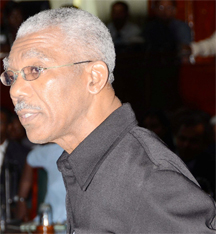The new make-up of the National Assembly can help bridge the gap between the Parliament and the wider population, Opposition Leader David Granger believes.
Granger, the Chairman of opposition coalition of A Partnership for National Unity (APNU), says he is committed to representing the needs of the population and will be pushing for the major concerns of Guyanese to be addressed in the House.

“I can say certainly over the last 19 years the public has not been able to have its voice heard. I think that the National Assembly was too distant from the public and that so frequently were opposition motions watered down or not heard, that the public seemed to lose interest; it did not understand the power the National Assembly had to change lives,” Granger said during a recent interview with this newspaper.
According to him, Guyanese only saw the ills in society and viewed the National Assembly as bringing no change to the situation. “They saw crime, they saw poverty, they saw collapsing standards in education, they saw corruption and they didn’t feel that the National Assembly was bringing about any change,” he said. “I would doubt that they even knew who the Members of Parliament (MPs) were,” he added.
The recently elected Opposition Leader suggested that in recent times many citizens did not feel the National Assembly was relevant to their day-to-day lives. However, he believes this will now change. “I think with the new office of the Leader of the Opposition and with the new Speaker they will be more intimately involved, they will care more because they will see measures being introduced which will affect their lives and their livelihoods,” Granger opined. Following his election as Speaker two Mondays ago, Granger had promised to set up a Leader of the Opposition office which would be distinct from his party office.
Questioned about new systems that may need to be implemented to ensure this is achieved, Granger said that these already exist, while emphasizing that now “it’s a question of ensuring they work in favour of the majority.” The APNU, Granger said, will be making full use of the parliamentary committees to achieve its agenda. “There are several parliamentary committees and we have a clear agenda in terms of advancing our measures for good governance, in terms of the financial management, in terms of rebuilding the institutions of the country.
We have a very clear idea where we want to go and we intend to use the parliamentary mechanisms particularly the committee system to ensure those measures are implemented,” he declared. Meanwhile, Granger said the media will have an important part to play in bridging the gap between the Parliament and the people. “The media are very important means in getting information to the mass of the people,” he said, while noting that there are many areas, particularly in the hinterland regions, that do not have access to the media.
“Without media, people don’t have information to make informed decisions. For example, we know the situation in the Upper Demerara/Berbice Region (Region 10) where the state controls the main television. People are really fed up. I don’t think the PPP/C really [understands] how fed up the people are… with that television station.“
He restated his party’s commitment to ensuring the reform of the state media and to see “genuine liberalization” in other media “so that the people can hear what they want to hear.
This is 2012, not 1912,” he said. He said that the APNU would be fighting the cause of those television stations which want to be allowed more powerful transmitters so they can extend their signals beyond the range currently permitted.
Granger also indicated his support for having the sittings of the National Assembly broadcast so that Guyanese can see what is happening in the Parliament.





